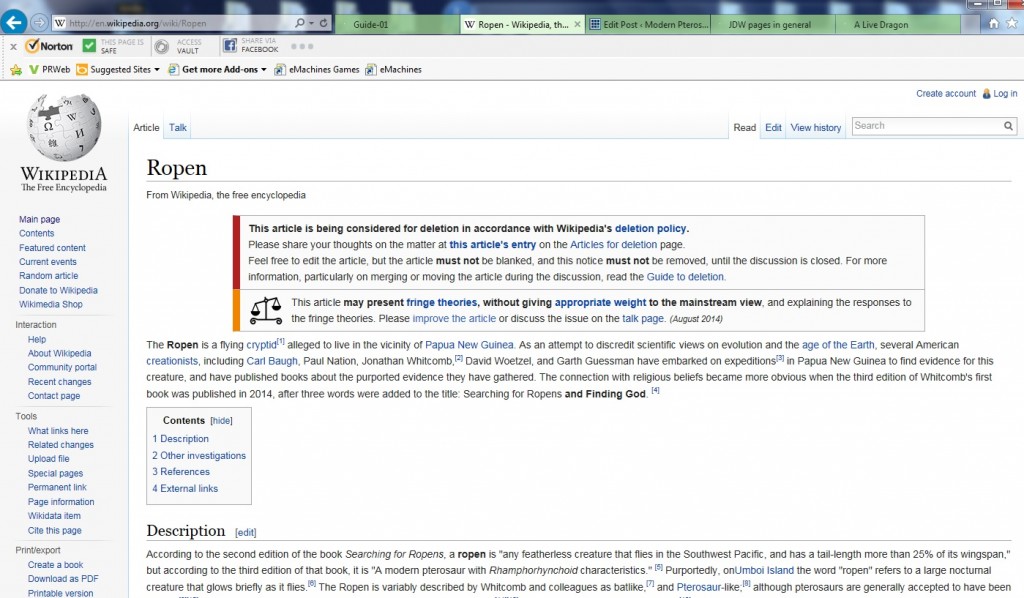I have no direct evidence that the biology professor Myers (at the University of Minnesota, Morris) had any direct part in the deletion of the Wikipedia article “Ropen” within the past few days; his blog post may have contributed to the extinction of that page on Wikipedia, however (“There are no living pterosaurs and ‘ropen’ is a stupid fantasy”). It seems likely that one or more of his students or one or more of the readers of his post were involved. Regardless, you will no longer see Wikipedia’s “Ropen” page at the top of a Google search for that cryptid, for that page is now extinct.
Screen Shot of the top of the Wikipedia page “Ropen” (from about August 20, 2014)
.
The Ironic Reasoning Behind the “Ropen” Deletion
Supposedly, it was “lack of appropriate weight to the mainstream view” that killed off the page. Bigfoot, watch out, for you may be next. What’s ironic about the loss of one page from Wikipedia? I tried, earlier this month, to add a mainstream viewpoint to that page, to prevent the whole article from being deleted. That’s when, within a few minutes, my contribution itself was deleted. Why? Because, said that self-appointed editor, I had selectively quoted a paleontologist in such a way as to leave an impression that was misleading. What nonsense! Any person who would have taken the trouble to compare my quoting with the original source—that person could have seen that the meaning was exactly the same.
The big irony is that I was trying to contribute material that was contrary to my own personal beliefs, to save the “ropen” article from deletion. Perhaps the self-appointed editor who deleted my attempt assumed that I must have quoted wrongfully (because of my beliefs); yet how could that editor have done all of the following, within about five minutes, and still have had time to consider it carefully?
- He found my contribution on that Wikipedia page
- He noticed the ellipses (. . .) [which were from things like English mistakes and needless repetition]
- He deleted my paragraph [which could have saved the whole “ropen” article]
- He wrote his brief explanation for his deleting it
It took me hours to create that paragraph, including the research and the necessary formatting of the references and careful consideration of the quoting of the paleontologist. Yet that editor deleted the whole thing within about five minutes. To be brief, I soon gave up on trying to contribute anything, ever again, on Wikipedia.
Twisting the Point of the Mainstream View
If the biology professor in Minnesota was so concerned about the mainstream view being portrayed, why did he not add a paragraph about the improbability of living pterosaurs, on that Wikipedia article? He did at least imply, in his post, that he had little confidence in Wikipedia in general, but then why did he keep mentioning that Wikipedia page? Was it only a coincidence that “Ropen” was marked for deletion at about the same time as the publication of that professor’s blog post? I don’t know. But if the mainstream view is so decidedly against the possibility of any living species of pterosaur, why did not one biologist or paleontologist contribute just one small paragraph to explain that? Their lack of involvement caused the extinction . . . not the demise of all species of Rhamphorhynchoid pterosaurs but the article about the ropen.
What next for cryptozoology? Will Bigfoot be blasted off the face of Wikipedia? From the length of the objections to the existence of the big fellow, on the Wikipedia “Bigfoot” article, it seems unlikely, for both sides are well represented. Still, it brings up a point on which Professor Myers and I seem to agree: Wikipedia is not always dependable.
###
Lie on Wikipedia “Ropen” Article?
There lies a weakness in Wikipedia, although a solution seems hard to come by. When proponents of the “mainstream view” on a subject seem reluctant to state their orthodox opinions, in sufficient content-size, a fringe theory can appear to be unbalanced in an article, favoring too much an unpopular point of view.




